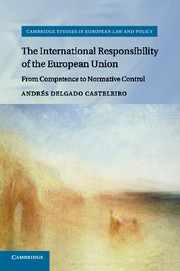Book contents
- Frontmatter
- Contents
- Series Editors' Preface
- Acknowledgements
- Introduction
- 1 The EU's Normative Control and International Responsibility
- 2 Codifying of the Responsibility of International Organizations (I): The Impact of ARIO's Rules of Attribution on the EU
- 3 Codifying of the Responsibility of International Organizations (II): The Impact of ARIO's Rules of Responsibility on the EU
- 4 EU Declarations of Competence to Multilateral Agreements: A Useful Internal Reference Base?
- 5 The Apportionment of the EU's International Responsibility in International Environmental Law: The International Application of EU Declarations of Competence
- 6 The EU's Normative Control and International Responsibility: The WTO Dispute Settlement System
- 7 Normative Control in the EU and the Responsibility of Member States: An Analysis of the Responsibility of the EU in International Investment Law
- Conclusions
- Bibliography
- Index
6 - The EU's Normative Control and International Responsibility: The WTO Dispute Settlement System
Published online by Cambridge University Press: 05 September 2016
- Frontmatter
- Contents
- Series Editors' Preface
- Acknowledgements
- Introduction
- 1 The EU's Normative Control and International Responsibility
- 2 Codifying of the Responsibility of International Organizations (I): The Impact of ARIO's Rules of Attribution on the EU
- 3 Codifying of the Responsibility of International Organizations (II): The Impact of ARIO's Rules of Responsibility on the EU
- 4 EU Declarations of Competence to Multilateral Agreements: A Useful Internal Reference Base?
- 5 The Apportionment of the EU's International Responsibility in International Environmental Law: The International Application of EU Declarations of Competence
- 6 The EU's Normative Control and International Responsibility: The WTO Dispute Settlement System
- 7 Normative Control in the EU and the Responsibility of Member States: An Analysis of the Responsibility of the EU in International Investment Law
- Conclusions
- Bibliography
- Index
Summary
Introduction
Unlike mixed agreements with a declaration of competence, the responsibility of the EU in the WTO system is not aprioristically linked to the internal division of competences. The EU has not established any kind of mechanism to make its division of competence clear to third parties that may want to bring a claim against it or its Member States. As a logical consequence of the lack of a mechanism designed to deal with EU responsibility in the WTO, to understand how the EU manages its responsibility in the WTO it is necessary to examine the disputes to which the EU has been party. The practice until now shows the EU being involved (apart from the disputes brought directly against it) in practically all the disputes against any of its Member States in one way or another. While this practice has led to the assumption that the EU is eager to be held responsible in the WTO, this chapter will argue that in most of the cases there is an EU law element which points to the EU's responsibility.
The discussions on the EU's responsibility in the WTO usually mention the position taken by the EU during the LAN dispute. In this case, the US brought separate panels against the EU, Ireland and the UK regarding, among other things, the tariff treatment of LAN. Though a procedural agreement was reached between the US, the EU, and its two Member States by which the complaints lodged against the latter were merged into a single claim against the EU, the US expressed the common concerns of third parties regarding the responsibility of the EU and Member States in mixed agreements where no declaration of competence has been made. In particular, the US requested that the panel ‘specify which of these parties was responsible to the US for this nullification or impairment [of] the value of concessions accruing to the US under the GATT 1994’. As a response to this demand from the US, the EU declared that it was:
ready to assume the entire international responsibility for all measures in the area of tariff concessions, whether the measure complained about has been taken at the [EU] level or at the level of Member States.
- Type
- Chapter
- Information
- The International Responsibility of the European UnionFrom Competence to Normative Control, pp. 161 - 194Publisher: Cambridge University PressPrint publication year: 2016



